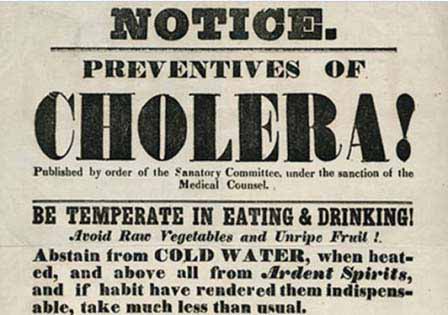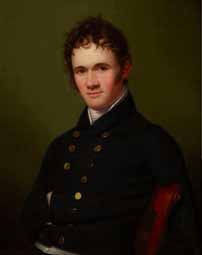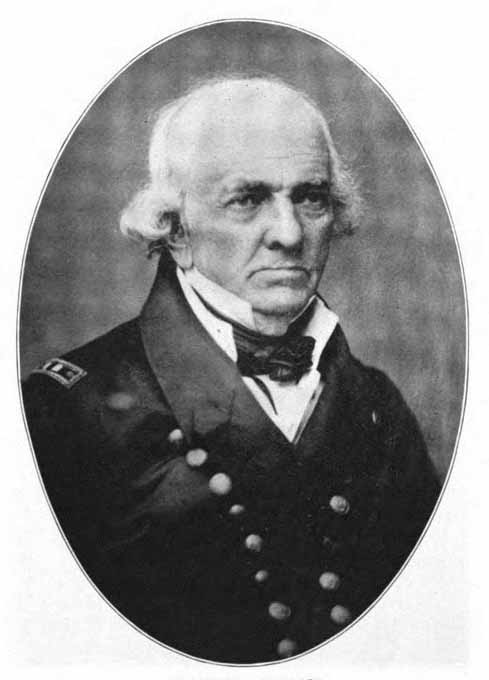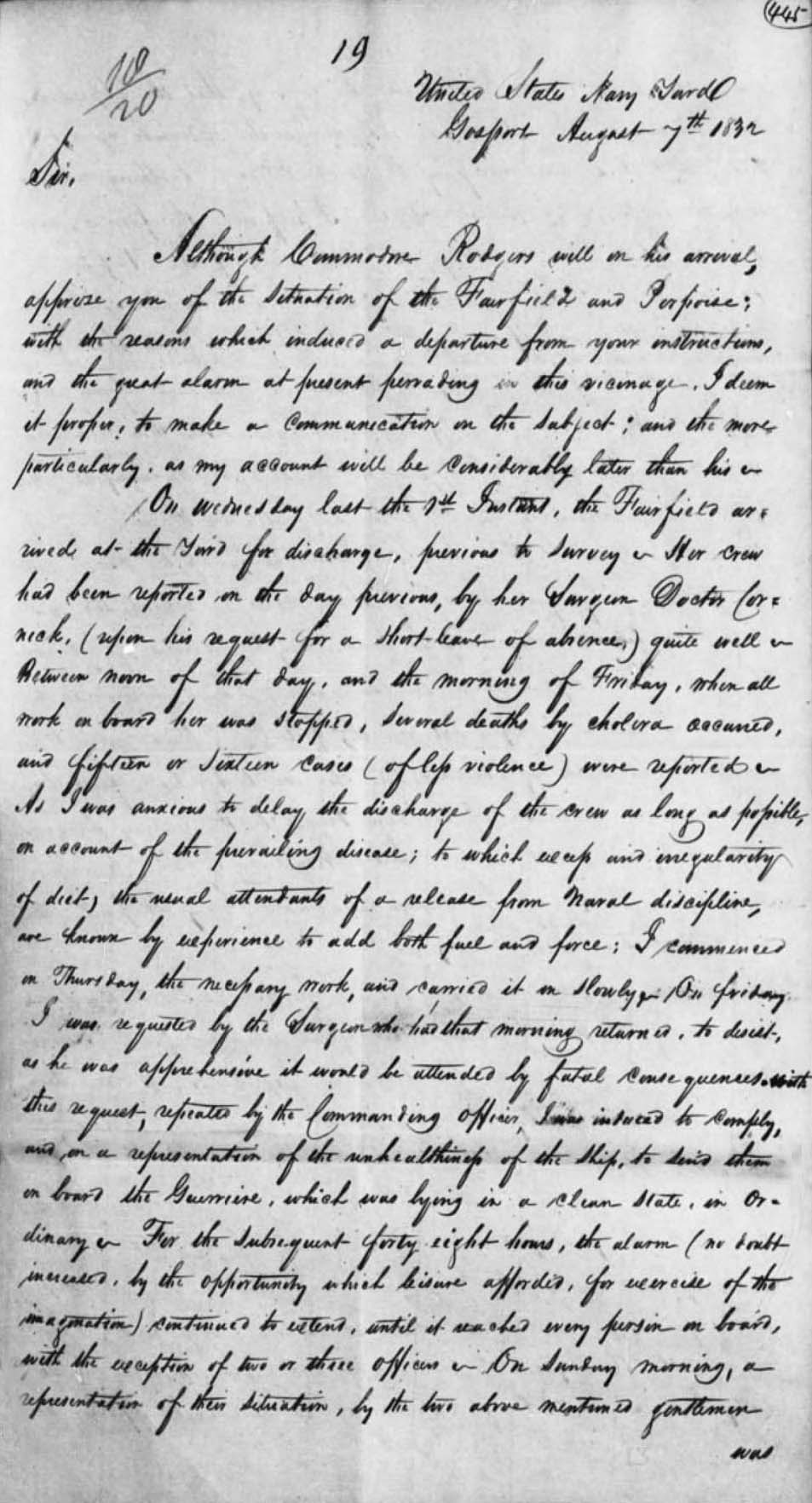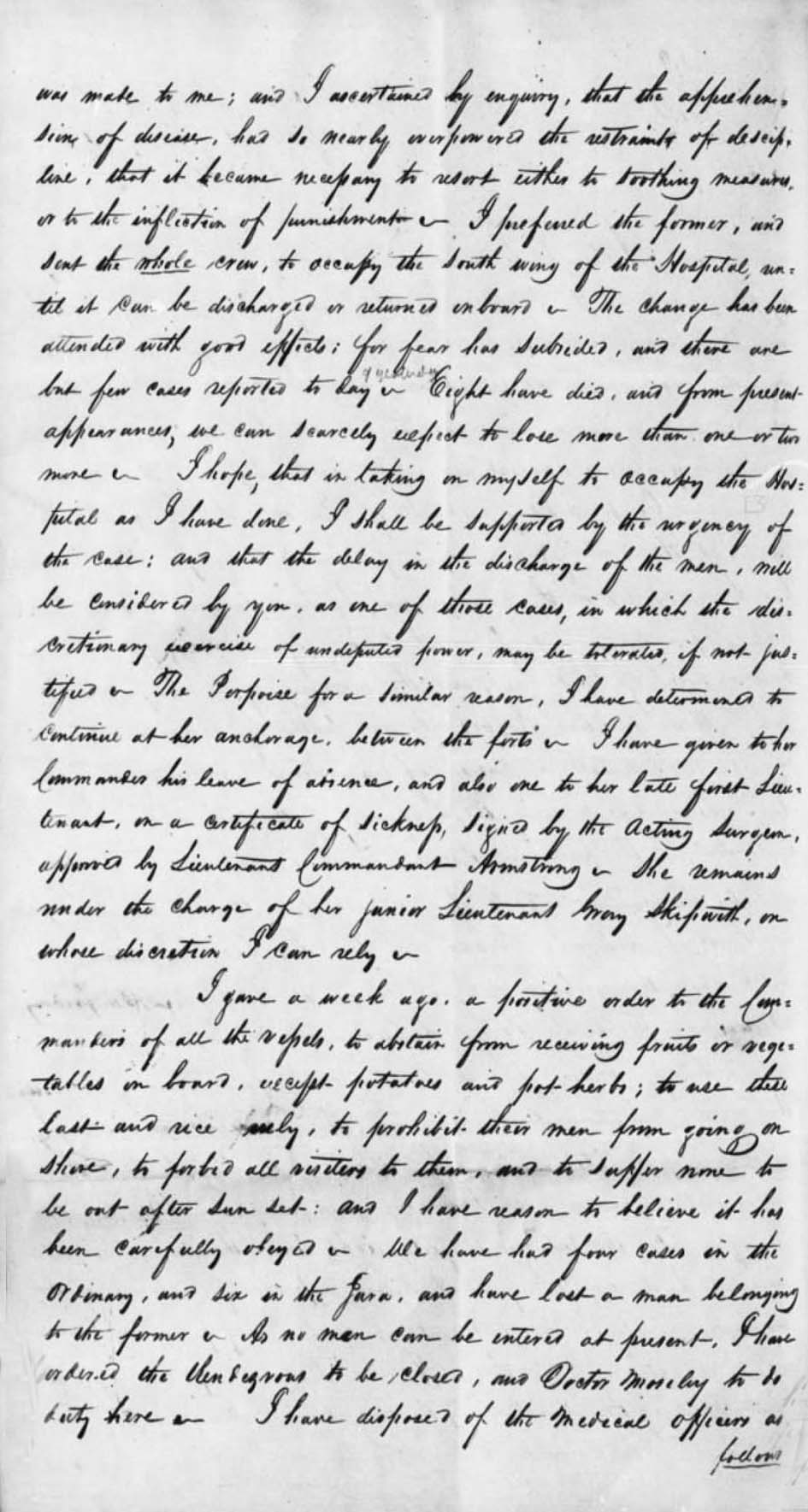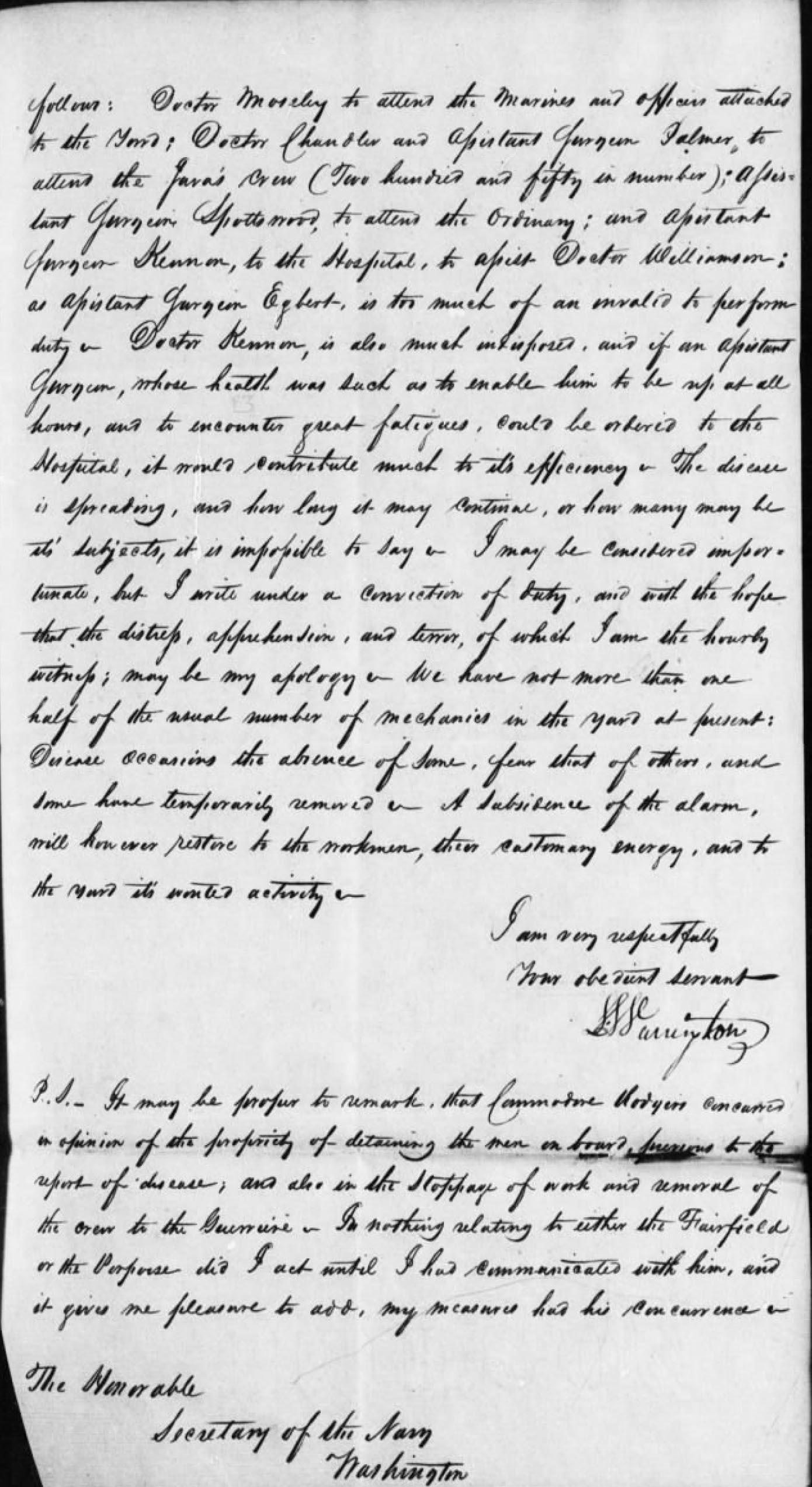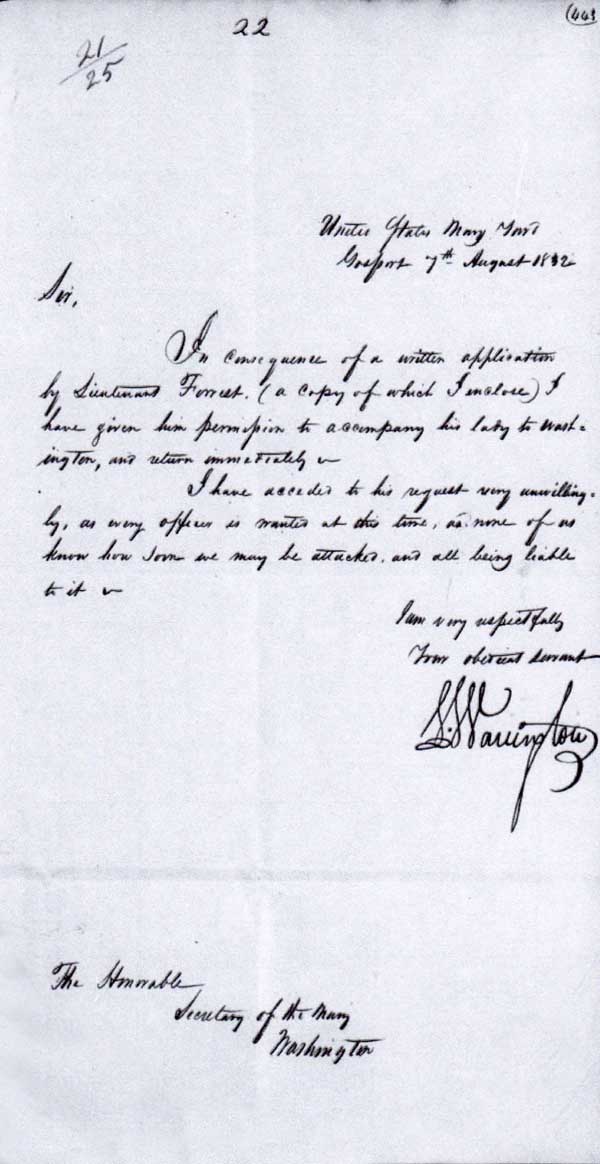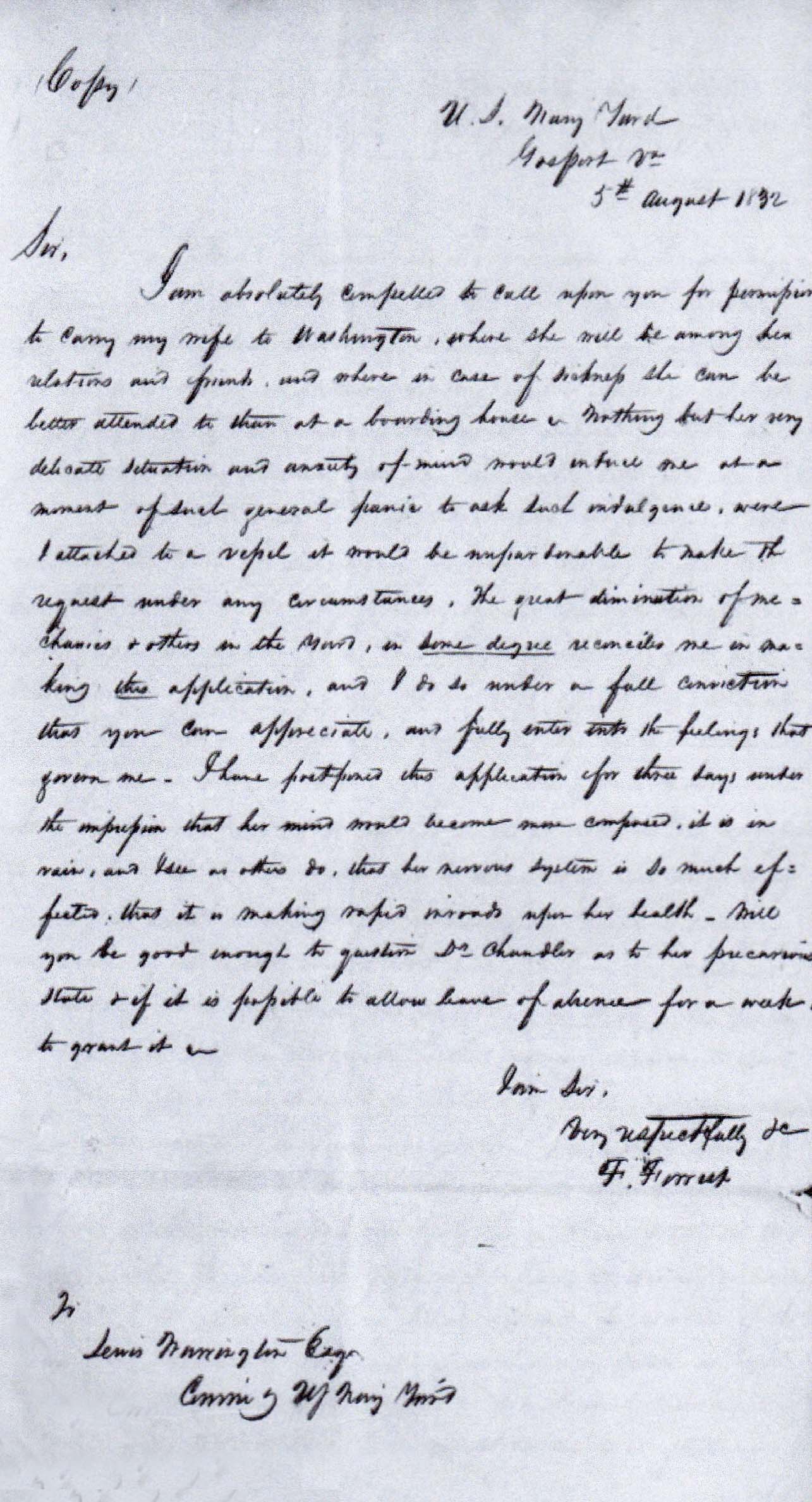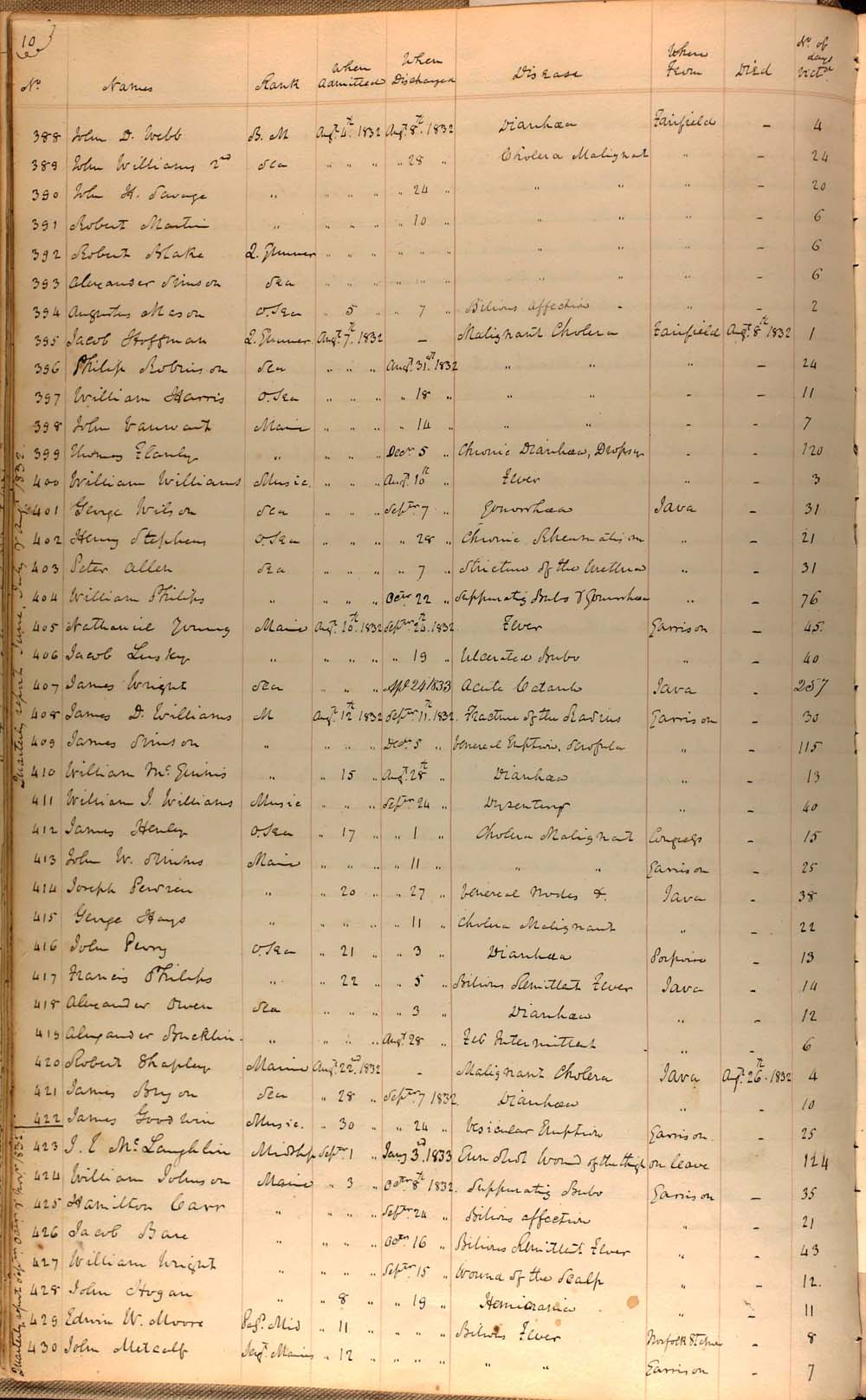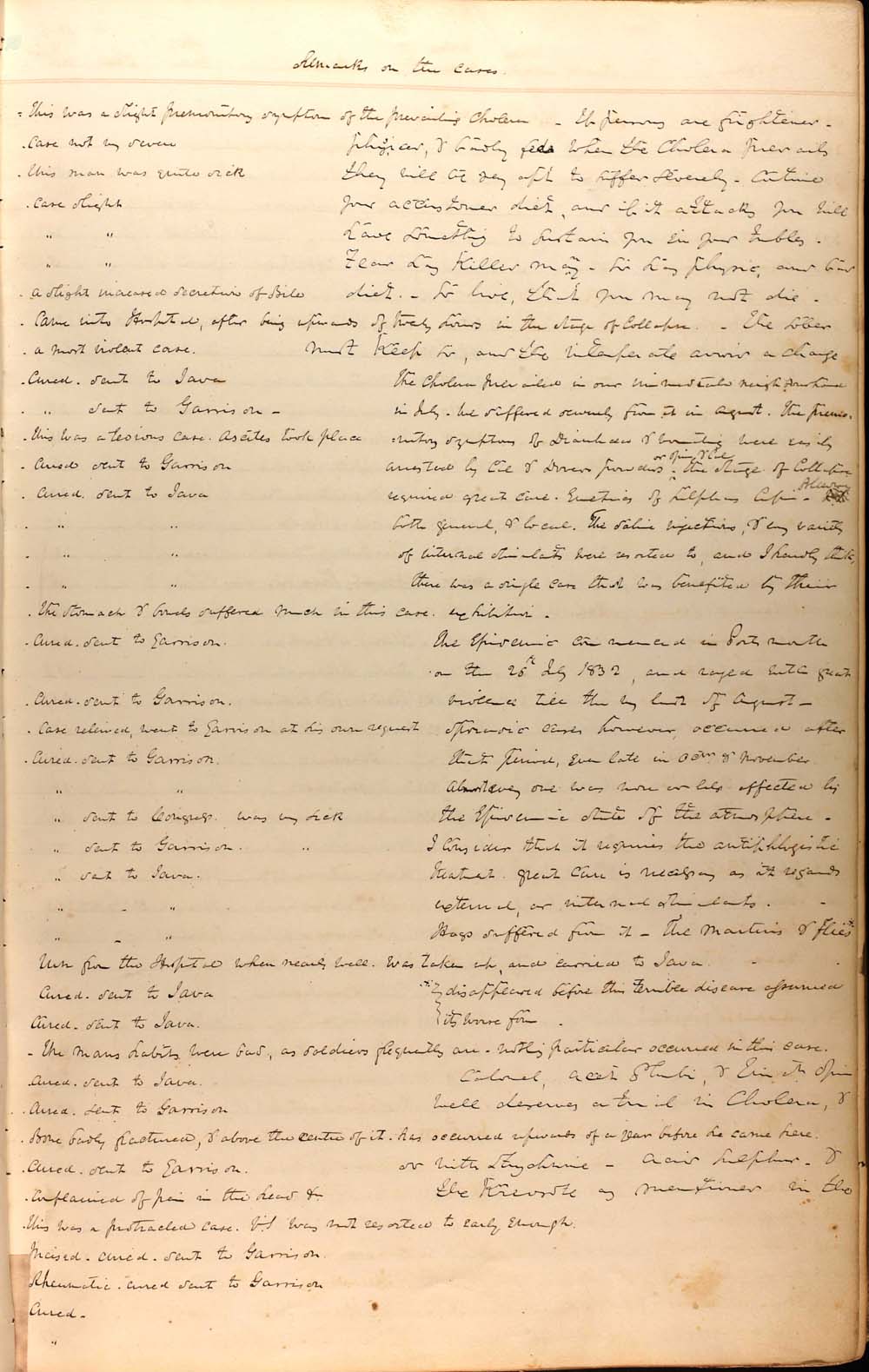SPECIAL TOPICS CONTRIBUTIONS BY JOHN G. SHARP
Cholera at Gosport Navy Yard 1832
Introduction: These important and little known letters of Commodore Lewis Warrington to the Secretary of the Navy Levi Woodbury during the awful summer of 1832, chronicle how cholera roared through the navy yard and the Gosport community.
Discussion: Cholera was one of the greatest killers of the nineteenth century. In 1832 the disease was unfamiliar with no cure, and consequently terrifying. Medical professionals were unable to identify a source or cause, much less a cure. Doctors were powerless to stop the advancing death toll that claimed thousands of lives around the world. It was not until 1854 that London physician, Dr. John Snow first identified the disease as water born. The same year Italian anatomist Dr. Filippo Pacini was first to isolate the infectious bacterium Vibrio cholerae as the cause of cholera.1 Previous to those discoveries, many American doctors followed their European counterparts and associated cholera with a miasma of bad air. Still others blamed the poverty of certain communities or poor environment. Some churches claimed cholera was a divine scourge and advocated a “national day of fasting, humiliation, and prayer in response to the epidemic.”2 Others looked for more earthly causes and believed the disease was possibly contagious, however, they did not understand how it spread.3
What was certain was the disease struck quickly and hard. Typically violent diarrhea, acute spasmodic vomiting, and severe cramps signaled the onset of the disease. Unknown to the world medical community of 1832, Vibrio cholerea produces a powerful toxin in the small intestine that binds to the intestinal walls and interferes with the normal flow of sodium and chloride. This causes the human body to secrete enormous amounts of water, producing diarrhea and a rapid loss of fluids and salts (electrolytes). Serious dehydration and often cyanosis gave the victims face and skin a bluish tint. Many cholera sufferers died within hours of contacting the disease. “If the loss of fluids isn’t reversed, the patient can die”.4 New to everyone, this plague was spread by polluted water, and struck hardest in poor sections where water quality was at its worst.
The purported cures of the era were nearly as bad as the disease and only exacerbated the physiological crisis while any positive effects were mostly placebo. “These pseudoscientific remedies almost never provided patients the one vital action; rehydrate.”5 The standard medical treatment of the day prescribed bloodletting, the use of laudanum, or cathartics, and purgatives such as calomel and castor oil.6 In many municipalities public health officials advised the public “to avoid crude fruits and vegetables and abstain from cold water.”7 As the pandemic moved from Europe into North America and cut through major cities and rural hamlets; the death toll rose. That summer, it was in Montreal on 6 June and killed 2,200 of the 2,800 permanent residents of Quebec. By 2 July the New York City Board of Heath admitted that cholera had arrived, and by September the disease had killed 3,513 people.8 Likewise, in Washington DC (where there are no reliable mortality figures), Michael Shiner, an enslaved laborer at the Navy Yard recorded, “The time the colery [cholera] broke out in about June and July August and September 1832 it Raged in the City of Washington and every day they wher [were] twelve or 13 carried out to they [their] graves a day.”9
The letters reveal that by 1 August 1832 cholera was already in Portsmouth. Warrington, formerly commandant of the Pensacola Navy Yard and commodore of the West India Squadron, had vast experience dealing with diseases such as yellow fever and small pox. Dr. Jonathan Cowdery head of the Gospost Naval Hospital was one of the oldest and best regarded surgeons in the U.S. Navy, with wide medical knowledge including enduring captivity in the Barbary Wars,10 but nothing had prepared either man or anyone else for this.11 From their letters both men were in contact and closely following ongoing events in New York City and Washington D.C. As early as 27 June Warrington anticipated an outbreak of disease during the summer months and requested two more physicians for the Receiving Ship Java. As part of his preparations, on 1 August, he confirmed he had canceled both Doctor Moseley and Chandler’s leave and ordered their return to duty.
On Tuesday morning, 7 August 1832, Warrington confirmed the worst, “Between noon of that day, [1 August] and the morning of Friday [3 August ], when all work on board her [USS Fairfield] stopped, several deaths by cholera occurred and fifteen or sixteen cases (of less violence) were reported”.12 He noted he felt “under a conviction of duty”, to report the tragedy, and hoped “that distress, apprehension and terror of which I am the hourly witness: maybe my apology”13 The Norfolk Beacon of 4 August confirmed this account “We regret to learn that about fifteen cases of the Cholera, three of them violent, have appeared on board the U.S. Ship Fairfield, now at the Navy yard at Gosport.”14 While there were no solid figures for Gosport, in Norfolk one scholar found 453 confirmed cases with a 26% mortality rate among whites and 74 % among blacks.15 How did the slaves fare? From Warrington’s letter of 12 October 1831, we know about one third of the shipyard’s civilian workforce were enslaved African Americans, “There are about two hundred and forty six blacks employed in the Yard and Dock altogether…”16 While we have no 1832 mortality figures or much information for navy yard civilian workers; white or black we might surmise, a similar death rate among the workers. On 7 August, Warrington mentions “We have not more than one half of the usual number of mechanics in the Yard at present: Disease occasions the absence of some, fear that of others, and some have temporarily removed.” As Norfolk reeled and the death toll grew, his belief in “predisposing causes” led him to suggest those who died in the navy yard of the cholera; were “victims of their insubordination and intemperance …”17 Warrington, for fear of contagion, was “anxious to delay the discharge of the [Fairfield]crew as long as possible.” Unable to persuade the men to remain; he decided to isolate the entire crew and transfer them to the USS Guerrire then lying in Ordinary. After hearing this plan, the crew men, became upset, for they had just returned from a long cruise in the Gulf of Mexico and had expected to be discharged only to learn they were to be transferred to yet another vessel. On 5 August with the mounting death toll, panic and fear had spread to the crew. The sailors through their “representation,” asked to meet with the commodore. At this meeting Warrington, quickly discovered the men wanted to be set ashore with their discharges and pay. This fear was not confined to enlisted men, for as Warrington explained to Woodbury (7 August) as he approved Lt. Forrest’s request to remove his wife Emily to Washington DC, “none of us know how soon we may be attacked, [by cholera] and all being liable to it.” To the Secretary, he concluded, their “apprehension of the disease, has so nearly overpowered the restraint, of discipline , that it became necessary to resort of soothing measures or to the infliction of punishment – I preferred the former, and sent the whole crew to occupy the South wing of the Hospital; until it can be discharged or returned on board.” In short, Warrington simply did not have the resources or a guard force to contain the men.
Later that same day (7August 1832), he again wrote to update Woodbury that he had learned from the “Commanding officer of the Fairfield , visiting at the Hospital that last night, the whole crew abandoned the establishment, and are it is supposed in Norfolk – Considering that this detention, was a piece of humanity in my part, and that the order for their prompt discharge, had been only delayed for their Safety, it is unnecessary to take any further steps to retain them, and I have directed the Purser to pay them off; on application to him.” In a follow up letter to Woodbury dated 11 May 1832, Warrington told him the disease was decreasing and then expressed his anger with the frightened and rebellious Fairfield sailors , as he bluntly related, “Many of them, I understand, died in Norfolk of the cholera, the victims of their insubordination and intemperance.” On 22 August Warrington, was finally able to inform Woodbury, “I am pleased to announce that the cholera has quietly abated in this place and Norfolk”
Despite their best efforts Commodore Warrington, Dr. Cowdery, and the naval medical staff were unable to isolate the sailors as cholera devastated the Gosport and Norfolk communities. Warrington himself acknowledged panic and flight; were far more destructive than disease. The blunt statistics of the summer of 1832 can never fully reflect the terror of the crew on the Fairfield and those officers, sailors, marines, and civilians who remained at work in the navy yard and hospital as their colleagues died. What made these deaths so frightening was they all occurred within a few days or weeks; which greatly magnified the horror. The Norfolk and Gosport naval doctors, nurses, and attendants nevertheless remained on duty throughout the epidemic and worked heroically to check the ravages of the disease and allayed people’s fears. Their letters transcribed below allow us to momentarily glimpse their world during that terrible summer.
Transcription: This transcription was made from digital images of letters and documents received by the Secretary of the Navy, NARA, M125 “Captains Letters” National Archives and Records. In transcribing all passages from the letters and memorandum, I have striven to adhere as closely as possible to the original in spelling, capitalization, punctuation, and abbreviation, superscripts, e.g. Do same as, etc., including the retention of dashes and underlining found in the original. Words and passages that were crossed out in the letters are transcribed either as overstrikes or in notes. Words which are unreadable or illegible are placed in square brackets. When a spelling is so unusual as to be misleading or confusing, the correct spelling immediately follows in square brackets and italicized type or is discussed in a foot note. The names of all ships are italicized. Names, ranks, dates of naval and marine officers, listed below in the endnotes are unless otherwise specified, from Naval History and Heritage Command Officers Continental and US Navy and Marine Corps 1775 -1900
https://www.history.navy.mil/research/library/online-reading-room/title-list-alphabetically/o/officers-continental-usnavy-mc-1775-1900.html
John G. Sharp 19 February 2019
===================================
United States Navy Yard
Gosport 6th July 1832
Sir,
As this season of the year is generally productive of highly inflammatory cases of fever and other diseases peculiar to it, I with reluctance call your attention to the Receiving Ship Java, which is without a medical officer, although containing upwards of two hundred and fifty persons – I see an Assistant Surgeon is provided for in the estimate & the presence of one is I think necessary – The Surgeon of the Yard, has been since his appointment, allowed to live in Norfolk, which leaves us generally with an assistant only, whose family also resides in Norfolk – As newly enlisted men are particularly liable to sudden and severe attacks, the consequence of dissipation and intemperance, I am desirous to have medical assistance at hand, all the time -
I am very respectfully
Your obedient Servant
L. Warrington
The Honorable Secretary of the Navy
[Note on obverse Sec Nav.], “Order an assistant to Receiving Ship for W”
[Sec Nav. Clerk], “None nearer than Philada Doctor Palmer is a fit subject for the order” [Sec Nav], “order him”
Orderd 29 June 1832
Honorable Secretary of the Navy Washington
===================================
United States Navy Yard
Gosport 6th July 1832
Sir, I enclose the copy of a letter which has this morning been addressed to me by Doctor Cowdery, the Surgeon of the Yard, who also attends the men on board the Receiving Ship - I addressed you on a similar subject on the 27th ultimo; and beg leave to remark, that the application of that day, requires additional force by the indisposition of Surgeons Mate Kennon -
I am very respectfully
Your obedient Servant
L. WarringtonThe Honorable Secretary of the Navy Washington
[Enclosure]
===================================
United States Navy Yard
Gosport 6th July 1832
Sir, In anticipation of autumnal diseases which in former years has been more or less prevalent on this station; and also in anticipation of the cholera, which we have much reason to expect, and which I desire to be enabled to control at every point I therefore respectfully require two more assistant Surgeons, one to be stationed on board the Receiving Ship, and the other at the Marine Barracks, for such services as exigencies may require –
Doctor Kennon the only assistant under my charge is laboring under a glandular affection of his neck to a degree that I fear he will not be able to be much assistance for a considerable period of time –
I am respectfully Sir
Your obedient Servant
Jon Cowdery18
Surgeon USN
Commodore Lewis Warrington
Commg US Navy Yard Gosport
===================================
United States Navy Yard
Gosport August 1st 1832
Sir,
I have ordered Doctor Moseley who was in Norfolk, on leave to attend the Rendezvous19 which is this day opened, as Doctor Terrill has by your permission a leave of absence –20
I shall in case the cholera, which it appears prevails to some extent in the adjoining town of Portsmouth, attacks the sailors or the Marines, order Doctor Chandler also on duty. I hope the necessary for prompt provision in both cases will be a sufficient apology for any seeming disregard of your indulgence to those officials –
I am very respectfully
Your obedient Servant
L. WarringtonThe Honorable Secretary of the Navy Washington
===================================
United States Navy Yard
Gosport August 7th 1832
Sir,
Although Commodore Rodgers will on arrival appraise you of the Situation of the Fairfield and Porpoise; with the reasons which induced a departure from your instructions, and the great alarm of the present pervading in this vicinity.21 I deem it proper to make a Communication on the subject; and the more particularly, as my account will be considerably later then his –22
On Wednesday last the 1st instant, the Fairfield arrived at the Yard for discharge, previous to survey- Her crew had been reported on that day previous, by her Surgeon Doctor Cornick (upon his request for a short leave of absence) quite well - Between noon of that day, and the morning of Friday, when all work on board her stopped, several deaths by cholera occurred and fifteen or sixteen cases (of less violence) were reported –23 As I was anxious to delay the discharge of the crew as long as possible, on account of the prevailing disease ; to which excess and irregularity of diet, the usual attendants of the release of Naval discipline , are known by experience to add both fuel and force: I commenced on Thursday, the necessary work , and carried it on slowly - On Friday I was requested by the Surgeon who had that morning returned , to desist as he was apprehensive it would be attended with fatal consequences, this request was repeated by the Commanding officer, I was induced to comply and on a representation of the unhealthiness of the ship, to send them on board the Guerrire , which was then lying in a clean state, in Ordinary -24 For the subsequent forty eight hours, the alarm (no doubt increased by the opportunity which leisure afforded, for the exercise of the imagination) continued to extend, until it reached every person on board, with the exception of two or three officers – On Sunday morning, a representation of their situation, by the two above mentioned gentlemen was made to me; and I as ascertained by inquiry that the apprehension of the disease, has so nearly overpowered the restraint, of discipline , that it became necessary to resort of soothing measures or to the infliction of punishment – I preferred the former, and sent the whole crew to occupy the South wing of the Hospital; until it can be discharged or returned on board – The change has been attended with good effects; for fear has subsided, and there are but few cases reported today – Eight have died, and there are from appearances , we can scarcely expect to lose more than one or two more - I hope, that in taking on myself to occupy this hospital as I have done, I shall be supported by the urgency of the case: and that the delay in the discharge of the men, will be considered by you, as one of those cases, in which the discretionary exercise of undisputed power, may be tolerated if not justified - The Porpoise for a similar reason I have determined to continue at her anchorage , between the forts - I have given to her commander his leave of absence, and also one to her later first Lieutenant, on a certificate of sickness signed by the Acting Surgeon approved by Lieutenant Commander Armstrong25 - She remains under the charge of her junior Lieutenant Grey Skipworth, on whose discretion I can relay –26
I gave a week ago, a positive order to the Commanders of all vessels to abstain from receiving fruit or vegetables on board, except potatoes and pot herbs; to use these last and rice only to prohibit their men from going on shore, to forbid all visitors to them, and to suffer none to be out after sun set: and I have had four cases in the ordinary, and six in the Java,27 and we have lost a man belonging to the former - As no men can be entered at present. I have ordered the Rendezvous28 to be closed, and Doctor Moseley to do duty here –29 I have disposed the Medical Officers as follows: Doctor Moseley to attend to the marines and Officers attached to the Yard; Doctor Chandler and Assistant Surgeon Palmer30 to attend the Java’s crew (Two hundred and fifty in number); Assistant Surgeon Spotswood31 to attend the Ordinary ; and Assistant Surgeon Kennon,32 to the Hospital, to assist Doctor Williamson; and Assistant Surgeon Egbert is too much of an invalid, perform duty Doctor Kennon is also much indisposed , and if an Assistant Surgeon , whose health was such as to enable him to be up at all hours, and encounter great fatigues, could be ordered to the Hospital, it would contribute much to its efficiency -33 The disease is spreading, and how long it may continue, or how many may be the subjects it is impossible to say-I may be considered importuned, but I write under a conviction of duty, and with the hope that distress , apprehension and terror of which I am the hourly witness: maybe my apology - We have not more than one half of the usual number of mechanics in the Yard at present: Disease occasions the absence of some, fear that of others, and some have temporarily removed – A subsidence of the alarm, will however restore to the workmen, their customary energy, and to the Yard its wanted activity –
I am very respectfully
Your obedient Servant
L. Warrington
P.S. It may be proper to remark, that Commodore Rodgers concurred in opinion of the propriety of detaining the men on board to the report of the disease; and also in the Stoppage of the work and removal of the crew to the Guerriere – In nothing relating to either the Fairfield or the Porpoise did I act until I had communicated with him , and it gives me pleasure to add, my measures had his concurrence –34The Honorable Secretary of the Navy Washington
===================================
United States Navy Yard
Gosport August 7th 1832
Sir,
Since my letter of this morning, I have been informed by the Commanding officer of the Fairfield visiting at the Hospital, that last night the whole crew abandoned the establishment, and are it is supposed in Norfolk – Considering that this detention, was a piece of humanity in my part, and that the order for their prompt discharge, had been only delayed for their Safety, it is unnecessary to take any further steps to retain them, and I have directed the Purser to pay them off on application to him – The officers have received their leaves of absence and the Marines are ordered to the barrack –To retain them when their disposed to run is impossible as there is no enclosure
I am very respectfully
Your Obedient Servant
L. Warrington
The Honorable
Secretary of the Navy
===================================
Note Lieutenant French Forrest (1796 – December 22, 1866) had seen combat during the War of 1812 , but was sufficiently alarmed to request permission from Commodore Warrington to evacuate his wife Emily Douglas Sims to Washington DC. His letter some provides a hint of the dread; this new disease had on the population and how quickly spread to the whole community.35 Forest does not mention cholera by name, but instead “in case of sickness” Though Warrington was “unwilling” Lt. Forrest’s request was granted and both he and Emily survived the epidemic.United States Navy Yard
Gosport 7th August 1832
Sir,
Inconsequence of the written application of Lieutenant Forrest (a copy of which I enclose) I have given him permission to accompany his lady to Washington, and return immediately –
I have acceded to his request very unwillingly, as every officer is wanted at this time, as none of us know how soon we may be attacked, and all being liable to it –
I am very respectfully
Your obedient Servant
L. Warrington
The Honorable
Secretary of the Navy
Washington[Two Sec Nav. notes obverse] “Order another Lt. to report to Comm. W. for such duty as he may find the public interest prompted by.” [2nd note] “10 August 1832 order Lt. A.L. Slaughter, bringing him to W.”36
Enclosure
===================================U.S. Navy Yard
Gosport Va
5th August 1832
Sir,
I am absolutely compelled to call upon you for permission to convey my wife to Washington, where she will be among her relations and friends, and in case of sickness she can be better attended to than at a boarding house - Nothing but her very delicate situation and anxiety of mind would induce me at a moment of such general panic to ask such indulgence, were I attached to a vessel it would be unfair and unpardonable to make the request under any circumstances. The great diminution of mechanics & others in the Yard, in some degree reconciles me in making this application, and I do so under a full conviction that you can appreciate, and fully enter into the feeling, that governs me. I have postponed the application for three days under the impression that her mind would become more composed, it is in vain, and I see as others do that her nervous system is so much effected, that it is making inroads upon her health - Will you be good enough to question Dr. Chandler as to her precarious state & if it is possible to allow leave of absence for a week to grant it –37
I am Sir,
Very Respectfully &c F. Forest
To Lewis Warrington Esq. Commg US Navy Yard
===================================
United States Navy yard
Gosport August 11th 1832
Sir,
I have had the honor to receive your several letters (four in number) of the 6th and 7th - The report respecting J.W. Smith shall be forthwith made and the discharge of Banningham and Hunter given on the prescribed conditions – My letter of the 7th , which you have ere this received; will inform you in what manner the Fairfield ‘s crew has been disposed of – Many of them , I understand, died in Norfolk of the cholera, the victims of their insubordination and intemperance – Although anxious to remove them to a place where they would be secure from disease , I could not help feeling some doubts of the sincerity of the alarm so apparently great, and express myself to that effect to the Commanding Officer and Surgeon, who personally represented their condition; but was assured that it was real- Their subsequent conduct has realized my suspicions –
The cholera is, I think on the decrease, with respect to both numbers and violence – all who could remove from either town have, believe, done so -
I am very respectfully
Your Obedient Servant
L. Warrington
The Honorable
Secretary of the Navy
===================================
United States Navy Yard
Gosport August 21st 1832
Sir,
I have the honor to enclose a list of the discharges, which have been ordered since the first of July last _ As these are principally of Ordinary Seamen and boys, we are not now as many of those two classes, as will be required for the Vandalia –All of those with the exception of two, has two years and a half to serve – We have about forty sick of various diseases, and have lost five by cholera -
I am very respectfully
Your Obedient Servant
L. Warrington
The Honorable
Secretary of the Navy
===================================
United States Navy Yard
Gosport August 22t 1832
Sir,
I have the honor to receive your letters of the 18th respectfully the discharges of several men belonging to the Fairfield , take the occasion to that a feeling of humanity induced me to retain those men until their health was completely reestablished - John Anderson will merit a Court Martial for insubordination, if not mutinous conduct – From the present appearances, you will have applications from the greater part (if not the whole) of the men on board for discharge, their impression being that they are only to ask and obtain it –
I am very respectfully Your Obedient Servant
L. Warrington
The Honorable
Secretary of the Navy
===================================
United States Navy Yard
Gosport August 22 1832
Sir,
I am pleased to announce took that the cholera has quietly abated in this place and Norfolk -
We have had several cases in the Ordinary and aboard the Java, one of which terminated fatally in the former and five in the latter -
I am very respectfully
Your Obedient Servant
L. Warrington
The Honorable
Secretary of the Navy
===================================
United States Navy Yard
Gosport August 30th 1832
Sir,
I enclose the application of Surgeons Mate Kennon requesting a leave of absence, and as he is frequently unable to attend to his duty, on account of ill health; I should recommend that it be give, provided it does not interfere with your arrangements – The disease, lately raging has so much abated that that we can dispense with his services –
In consequence of an application from Major R.M. Kirby Commanding at Fortress Monroe of the 25th instant (which reached me too late on the 26th, to comply with it) 38 I dispatched Doctor Moseley on the 27th to aid in attending the sick of that post, as there was but a single medical officer, and they were severely attacked by cholera - 39
I am very respectfully
Your Obedient Servant
L. Warrington
The Honorable
Secretary of the Navy
=================================== United States Navy Yard
August 30th 1832
Sir,
Your letter of the 25th I have had the honor to receive – That of the 26th ultimo respecting the Rendezvous has been received, and acted on, but in consequence of sickness as reported, in my letter of the 7th Instant, I had suspended the recruiting duty: and as you had been officially informed of it, I did not feel at liberty to reopen it without authority –
The whole crew of the Fairfield was discharged, as their unwillingness to remain, induced them all to run from the Hospital, as mentioned in my communication of the 7th Instant -
I am very respectfully
Obedient Servant L. Warrington
The Honorable Secretary of the Navy Washington
===================================
Baltimore Aug 30th 1832
Sir,
On my passage from Norfolk to this place I have been taken very sick. My object was to report myself to the Department in person; but as I cannot do this for several days, I am compelled to do it in another manner.
I wished to say to you that my health rendered it advisable for me not to go to sea again immediately ; and that if my successor was employed in any service or shore, I would be much gratified in offer of it to him. I use the word offer, because I am not in good health to go to a very northern station, and would like to be advised of it before the order is issued. However whatever the duty maybe I should like to know what it is and perhaps it may suit me. I would decidedly prefer Norfolk to any other place, saving the Rendezvous. I was once engaged in that service and the [illegible] I am desirous of avoiding it in the future, and such consideration among them for, [page missing?]
I am very respectfully your obedient servant James Cornick
[To] W. Boyle Navy Department, Washington D.C.
===================================
United States Navy Yard
Gosport September 8th 1832
Sir,
The cessation of disease has enabled me to release Doctor Chandler from the extra duty assigned him by my order of the 31st of July , and I avail myself of the occasion, to state he has assiduously and cheerfully devoted himself to its performance – As he was compelled to change his residence, and to reside on shore on this side, by the dispersed and various situations of those for whom his services were required – I feel bound to mention it, that if in your opinion, a per diem allowance can be granted ( as in the case of extra service) I think him fully entitled to it – I am strengthened in this belief , by the fact that he was on a leave of absence, and a residence of another place, at the time he received the order –I am very respectfully
Your Obedient Servant L. Warrington
The Honorable
Secretary of the Navy
===================================
United States Navy Yard
Gosport December 4th 1832
Sir,
I have the honor to send by this conveyance the copies of two communications by Doctor Williamson, on the use of chlorides of lime and soda, and on the enlistment of men for the Navy - His opinion of the first subject seems to be sound, and is certainly corroborative of, in which they are held by many officers of experience and observation – by them they are considered powerful but by no means principals in either the promotion or the cure of disease -40
The other subject, is of great importance, when we reflect upon the number of men condemned annually by survey, or sent to the Hospital, severely diseased or incurable – The number of people [illegible] too who are, daily creeping into the Service, is another subject for consideration – It is worthy of remark, that twenty one persons this day in the Naval Hospital, including three officers, more than a majority, are of this description – One maniac, and one idiot, are among the number of sick: the first sent from the Constellation last Spring, and the last from the St. Louis, when here - Both were enlisted but a short time previous I understand -41 I am very respectfully
Your Obedient Servant
L. Warrington
The Honorable
Secretary of the Navy===================================
Endnotes
1Steven Johnson The Ghost Map The Story of London’s Most Terrifying Epidemic and How it Changed, Cities and the Modern World (Riverhead Books: London 2006), 213
2Adam Jortner "Cholera, Christ, and Jackson: The Epidemic of 1832 and the Origins of Christian Politics in Antebellum America." Journal of the Early Republic 27, no. 2 (2007): 233-236 http://www.jstor.org/stable/30043497
3Edwin G Burrows and Mike Wallace Gotham A History of New York City to 1898 (Oxford University Press: New York,1999), 589 -590
4Cholera, the Invisible Enemy, Invades Southeastern Michigan and Monroe https://monroemichigan.wordpress.com/2016/12/18/cholera-the-invisible-enemy-invades-southeastern-michigan-and-monroe/ December 28 2016 Accessed 17 February 2019
5Steven Johnson, 51
6John H. Schroeder Commodore John Rodgers Paragon of the Early Navy (University Press of Florida: Tallahassee 2006), 198
7Charles E. Rosenberg The Cholera Years The United States in 1832 , 1849 and 1866, (University of Chicago Press:Chicago1987), 30, 85 and 108
8Harry Kollatz Jr., Life in the Time of Cholera When the disease struck Richmond, little was known about ‘The Summer Complaint” Richmond Magazine, August 18, 2015 https://richmondmagazine.com/news/richmond-history/life-in-the-time-of-cholera/
Accessed 10 February 2019 For deaths in New York City in 1832 see Edwin G Burrows and Mike Wallace, 591 for dates of arrival in Montreal and New York City see Adam Jortner "Cholera, Christ, and Jackson: The Epidemic of 1832 and the Origins of Christian Politics in Antebellum America." Journal of the Early Republic 27, no. 2 (2007): 233-64. http://www.jstor.org/stable/30043497
9Diary of Michael Shiner Relating to the History of the Washington Navy Yard 1813-1869
https://www.history.navy.mil/research/library/online-reading-room/title-list-alphabetically/d/diary-of-michael-shiner/introduction.html
Naval History and Heritage Command 2015, 49 editor John G. Sharp Retrieved 14 February 2019
10F. L. Pleadwell and W.M. Walker Jonathan Cowdery Surgeon in the United States Navy 1767 -1852 United States Naval Medical Bulletin Vol. 17 No’s 1-6 1922, 63 -89
11Warrington to Southard 8 August 1825 NARA M125 “Captains Letters” 7 Jul 1825 -15 Aug 1825 letter 101. Warrington to Southard 5 May 1826 NARA M125 “Captains Letters” 1 May 1826 -28 May 1826 letter 16
12Warrington to Levy 7 August 1832 NARA M125 “Captains Letters 1Aug 1832 -31 Aug 1832 letter 19, p.1.
13Warrington to Levy 7 August 1832 NARA M125 “Captains Letters” 1Aug 1832 -31 Aug 1832 letter 19, p.1.
14Norfolk Beacon Norfolk Va., 4 August 1832,3
15Todd Lee Savit Medicine and Slavery Diseases and Health Care Among Blacks in Antebellum Virginia (University of Illinois : Chicago 1981) ,230
16Warrington to Board of Navy Commissioners 12 October 1831 NARA See John G. Sharp Commodore Lewis Warrington writes to the Board of Navy Commissioners on the employment of enslaved workers in the construction of the Dry Docks 12 October 1831 http://www.usgwarchives.net/va/portsmouth/shipyard/nnysharp.html#enslaved Accessed 18 February 2019
17Warrington to Levy 10 August 1832 NARA M125 “Captains Letters 1Aug 1832 -31 Aug 1832 letter 35
18Jonathan Cowdery born 22 April 1767 Surgeon's Mate, 1 January, 1800. Surgeon, 27 November, 1804. Dr. Cowdery died 21 November, 1852.
19Rendezvous were naval recruitment centers, which opened and closed as directed by a local navy yard commandant such as Warrington to provide enlisted men for ships. At the Rendezvous, naval recruits were evaluated as to their job qualifications and their overall health by a physician or physicians mate. Following the exam, those deemed qualified were sworn in and signed shipping documents (“shipping” for two years or three) which stated the recruits name, his rating, the name of the vessel, length of enlistment, and wages and bounties paid. See Charles E. Brodine Jr., Michael J. Crawford and Christine F. Hughes Ironsides! The Ship, the Men and the Wars of the USS Constitution (Fireship Press 2007) 4720Samuel Moseley, Surgeon's Mate, 17 August, 1826. Surgeon, 4 April, 1831. Dr. Moseley resigned 13 April, 1852. Dr. George Terrill Surgeon USN, appointed 22 May 1826 resigned 21 September 1854.
21USS Fairfield was a sloop-of-war in the United States Navy. The Fairfield was launched 28 June 1828 by New York Navy Yard; and first put to sea 20 August 1828. She principally cruised in the West Indies and off the coast of Mexico. On 3 February 1845 she was decommissioned at Norfolk. Later that year she served briefly as receiving ship, then lay at Norfolk until 1852, when she was broken up. The schooner USS Porpoise was built in 1820 at Portsmouth Naval Yard Kittery Maine. She mainly cruised in the West Indies engaged in suppression of pirates and slavery. On the night of 2 November 1833 she ran aground on a coral reef.22Commodore John Rodgers was entered as a Lieutenant, on 9 March, 1798 and Captain, 5 March, 1799. He was discharged, 23 October, 1801, under Peace Establishment Act and subsequently reentered as Captain USN, on 25 August, 1802. John Rodgers was veteran of the Quasi War, the Barbary Wars, and the War of 1812. At the time of this letter 7 August 1832 he was inspecting in Gosport Navy Yard. Rodgers served on the Navy Board of Commissioners from 1827 to 1837. Rodgers died 1 August, 1838.
23James Cornick, Surgeon's Mate, 28 March, 1820, Surgeon, and 5 March, 1825. Cornick retired 18 June, 1861. He resigned 3 August, 1861.
24The “Ordinary” was designated for ships held in reserve, or for later need. Normally these were vessels like the USS Java that had seen hard service abroad and were awaiting restoration, or used for other purposes, but due to the small naval appropriations of the era, repairs were not possible. To maintain these ships required a substantial number of men to keep the vessels preserved and secure. The seamen assigned to the Gosport Ordinary were stationed on the shipyard either temporarily or for indefinite duration. Both groups were responsible for the maintenance of these laid up ships and the shipyard. The men of the Ordinary were under the under the command of the ship yard commandant i.e. Commodore Lewis Warrington. The Gosport Ordinary included a small group of specialized officers, such as the Purser and Storekeeper In keeping with naval regulations those assigned to the Gosport Ordinary were required to muster periodically for record keeping and pay purposes. The number of men assigned varied but regularly consisted of a half dozen officers and 20 to 40 enlisted seamen. Enslaved workers were also assigned as “Landsmen” and “Ordinary Seamen' on the payrolls of "the Ordinary". At Gosport African Americans such as George Teamoh were among many enslaved navy yard workers enumerated on the navy yard muster as "Ordinary Seamen". This subterfuge was widespread, Teamoh wrote, "I was again hired by the U.S. Government to work in its ordinary service. - was there some two years [1843-1844] on board Ship USS Constitution lying in ordinary off Norfolk Navy Yard ..." See George Teamoh God Made Man Man Made the Slave: The Autobiography of George Teamoh, edited by F.N. Boney, Richard L. Hume and Rafia Zafar (Macon: Mercer University Press, 1990) 82-83. Similar practices existed at Washington Navy Yard see John G. Sharp, editor "The Diary of Michael Shiner Relating to the History of the Washington Navy Yard 1813-1869, Naval History and Heritage Command, 2015, retrieved 11 February 2019
https://www.history.navy.mil/research/library/online-reading-room/title-list-alphabetically/d/diary-of-michael-shiner.html25James Armstrong Midshipman, 15 November, 1809. Lieutenant, 27 April, 1816. Master Commandant, 3 March, 1825. Captain, 8 September, 1841. Commodore, Retired List, 4 April, 1867. Died 25 August, 1868
26Grey Skip with Midshipman, 4 March, 1823. Passed Midshipman, 23 March, 1829 and Lieutenant, 3 March, 1831. Lt. Skipworth resigned 19 December, 1838.
27The frigate USS Java was built at Baltimore, Maryland in 1814 and 1815 by Flannigan & Parsons. Completed after the end of the War of 1812, the new frigate departed from Newport 22 January 1816 in the face of a bitter gale. At sea one of her masts snapped with ten men upon the yards, killing five. Java was off Algiers in April where Perry went ashore under a flag of truce and persuaded the Dey of Algiers to honor the treaty which he had signed the previous summer but had been ignoring. Next she sailed for Tripoli with Constellation, Ontario, and Erie to show the strength and resolve of the United States. Then, after a cruise in the Mediterranean stopping at Syracuse, Messina, Palermo, Tunis, Gibraltar and Naples, the frigate returned to Newport early in 1817 and was laid up at Boston, Massachusetts. Java returned to active service in 1827 under Captain William M. Crane for a second deployment in the Mediterranean. There she protected American citizens and commerce and performed diplomatic duties. Toward the end of the cruise she served as flagship of Commodore James Biddle. After returning to the United States in 1831, Java became receiving ship at Norfolk, where she was broken up in 1842.28Naval Rendezvous or recruiting stations were typically set up on a temporary basis in port cities such as Philadelphia, New York, Boston, and Norfolk.
29Samuel Moseley, Surgeon's Mate, 17 August, 1826. Surgeon, 4 April, 1831. Dr. Moseley resigned 13 April, 1852.
30George W. Palmer Surgeon's Mate, 18 August, 1826, Passed Assistant Surgeon, 3 March, 1835. Dr. Palmer died 6 November, 1836.
31W. A. W. Spotswood, Surgeon's Mate, 2 December, 1828. Surgeon, 20 February, 1838. Dr. Spotswood resigned 12 January, 1861.
32Richard Kennon, Surgeon's Mate, 17 November, 1824. Dr. Kennon resigned 12 November, 1833.
33Thomas Williamson, Surgeon's Mate, 27 May, 1818, Dr. Williamson died 12 January, 1859. Dr. Daniel Egbert, Assistant Surgeon, 22 August, 1829, Passed Assistant Surgeon, 3 March, 1835. Surgeon, 20 February, 1838, retired 21 December, 1861, Medical Director on Retired List, 3 March, 1871. Dr. Egbert died 24 October, 1875.
34Schroeder, 198.
35French Forrest, entered as a Midshipman, 9 June, 1811. Lieutenant, 5 March, 1817. Master Commandant, 9 February, 1837. Captain, 30 March, 1844. He was dismissed 19 April, 1861 and joined the Confederate States Navy. Forrest saw combat in the War of 1812 and the Mexican American War.
36Albert G. Slaughter entered as a Midshipman, 3 November, 1819. Lieutenant, 3 March, 1827. Commander, 16 May, 1848. He died 8 September, 1853.
37John R. Chandler, Surgeon USN, Surgeon's Mate, 14 November, 1824. Surgeon, 4 December, 1828. Dr. Chandler died 28 July, 1841.
38Major Reynold Marvin Kirby, commissioned 3rd Lieutenant U.S. Army 9 July 1813 , War of 1812 , Brevet to Major 17 September 1824, Second Seminole war 1836-1838, died 7 October 1842. Melatiah Everett Dwight The Kirbys of New England: A History of the Descendants of John Kirby of New England (Trow: New York 1898),186-187.39John B. Hamilton “The Epidemics of Chicago” Bulletin of the Society of Medical History of Chicago, Vol 1. October 1911, 73-75 The disease [cholera] was brought to Chicago by troops ordered from Fort Monroe Virginia to take part in the Black Hawk War.
40S. L. Kotar and J.E.Gessler Yellow Fever: A Worldwide History (McFarland:Jefferson N.C. 2017) 167-168.
41USS Constellation was a 38-gun wooden-hulled, frigate. She was built under the direction of David Stodder at his naval shipyard on Harris Creek in Baltimore's Fell's Point maritime community, and she was launched on 7 September 1797. Her first duties with the newly formed US Navy were to provide protection for American merchant shipping during the Quasi-War with France and to defeat the Barbary pirates in the First Barbary War. In 1825, Constellation was chosen as flagship for Commodore Lewis Warrington and began duty with the West India Squadron to eradicate waning piracy operations in the Caribbean. During an outbreak of yellow fever at Key West, Florida, Warrington moved the squadron's home port to Pensacola, Florida where a permanent base was established. Other ships operating with Constellation during this period in the West Indies were John Adams, Hornet, Spark, Grampus, Shark, Fox and Decoy. Warrington returned to the United States with Constellation in 1826. In August 1829, she cruised to the Mediterranean to watch over American shipping and to collect indemnities from previous losses suffered by U.S. merchantmen. While in route to her station, she carried the American ministers to France and the United Kingdom to their posts of duty. Returning to the United States in November 1831, she underwent minor repairs and departed again for the Mediterranean in April 1832 where she remained until an outbreak of cholera forced her to sail for home in November 1834.
===================================Gosport and the Navy Yard in a Time of Cholera
by John G. SharpIntroduction: Cholera was one of the greatest killers of the nineteenth century. The disease first reached North America at Quebec Canada in May 1832 on an immigrant ship and then quickly swept through the Eastern seaboard cities; reaching Gosport Virginia in summer of 1832. The disease was unfamiliar with no cure and consequently terrifying. Medical professionals were unable to identify a cause much less a cure; and doctors were powerless to stop the advancing death toll that claimed thousands of lives around the world. By the time cholera had spread Virginia, the epidemic had already killed 2,200 of the 2,800 permanent residents of Quebec and decimated the populations of Detroit and New York City.1 In the 1832 Norfolk cholera epidemic there were 453 confirmed cases. The disease killed large numbers, for Norfolk the disease had 26% mortality among whites and 74% among blacks.2 The higher black mortality was ascribed by white physicians in 1832 to blacks eating more vegetables and fruit, today modern scholars point to the fact the city’s black population mostly enslaved, was confined to the worst part of the city often forced to make do with contaminated water and with little access to health care. Unknown to everyone, the disease was spread by polluted rivers and struck hardest where city water quality was at its worst. At Gosport panic and fear quickly spread throughout the population. The following letter by Lieutenant French Forrest (1796 – December 22, 1866) then stationed in Gosport who had seen combat during the War of 1812, was sufficiently alarmed to request permission from Commodore Lewis Warrington to evacuate his wife Emily Douglas Sims to Washington DC. His letter some provides some idea how dread of this new disease quickly spread to the whole community.3 Lt. Forest does not mention cholera by name, but simply states “in case of sickness” Lt. Forrest’s request was granted and both he and Emily survived the epidemic.
John G. Sharp, 10 February 2019
Transcription: This transcription was made from digital images of letters and documents received by the Secretary of the Navy, NARA, M125 “Captains Letters” National Archives and Records. In transcribing all passages from the letters and memorandum, I have striven to adhere as closely as possible to the original in spelling, capitalization, punctuation, and abbreviation, superscripts, etc., including the retention of dashes and underlining found in the original. Words and passages that were crossed out in the letters are transcribed either as overstrikes or in notes. Words which are unreadable or illegible are so noted in square brackets. When a spelling is so unusual as to be misleading or confusing, the correct spelling immediately follows in square brackets and italicized type or is discussed in a foot note.
===================================
United States Navy Yard
Gosport 7th August 1832
Sir,
Inconsequence of the written application of Lieutenant Forrest (a copy of which I enclose) I have given him permission to accompany his lady to Washington, and return immediately –
I have acceded to his request very unwillingly, as every officer is wanted at this time, as none of us know how soon we may be attacked, and all being liable to it –
I am very respectfully
Your obedient Servant
L. Warrington
The Honorable
Secretary of the Navy
Washington[Sec Nav’s note on obverse] Order another Lt. to report to Comm W. for such duty as he may find the public interest prompted by.
10 August 1832 order Lt. A.L. Slaughter, bringing him to W.4Enclosure
===================================
U.S. Navy Yard
Gosport Va
5th August 1832
Sir,
I am absolutely compelled to call upon you for permission to convey my wife to Washington, where she will be among her relations and friends, and in case of sickness she can be better attended to than at a boarding house - Nothing but her very delicate situation and anxiety of mind would induce me at a moment of such general panic to ask such indulgence, were I attached to a vessel it would be unfair and unpardonable to make the request under any circumstances. The great diminution of mechanics & others in the Yard, in some degree reconciles me in making this application, and I do so under a full conviction that you can appreciate, and fully enter into the feeling, that governs me. I have postponed the application for three days under the impression that her mind would become more composed, it is in vain, and I see as others do that her nervous system is so much effected, that it is making inroads upon her health - Will you be good enough to question Dr Chandler as to her precarious state & if it is possible to allow leave of absence for a week to grant it –5
I am Sir,
Very Respectfully &c F. ForestTo Lewis Warrington Esq. Commg US Navy Yard
Endnotes:
Names, ranks, dates of naval and marine officers, listed below are unless otherwise specified, from Naval History and Heritage Command Officers Continental and US Navy and Marine Corps 1775 -1900
https://www.history.navy.mil/research/library/online-reading-room/title-list-alphabetically/o/officers-continental-usnavy-mc-1775-1900.html
1 Harry Kollatz, Jr., Life in the Time of Cholera when the disease struck Richmond, little was known about "The Summer Complaint" Richmond Magazine, August 18, 2015.
https://richmondmagazine.com/news/richmond-history/life-in-the-time-of-cholera/ Accessed 10 February 20192 Todd Lee Savit Medicine and Slavery Diseases and Health Care Among Blacks in Antebellum Virginia (University of Illinois : Chicago 1981), 230
3 French Forrest, entered as a Midshipman, 9 June, 1811. Lieutenant, 5 March, 1817. Master Commandant, 9 February, 1837. Captain, 30 March, 1844. He was dismissed 19 April, 1861, and joined the Confederate States Navy. He saw combat in the War of 1812 and the Mexican American War.
4 Albert G. Slaughter, entered as a Midshipman, 3 November, 1819. Lieutenant, 3 March, 1827. Commander, 16 May, 1848. He died 8 September, 1853.
5 John R. Chandler, Surgeon USN, Surgeon's Mate, 14 November, 1824. Surgeon, 4 December, 1828, Dr. Chandler died 28 July, 1841.
ARCHIVES
Left: Young Lewis Warrington
Right: Jonathan Cowdery, Surgeon in the United States NavyWarrington to Lewis Woodbury August 7, 1832, regarding cholera at navy yard and Gosport (3 pages)
Warrington to SecNav August 7, 1832, regarding Lt. F. French's request (2 letters)**********
"Memorandum of Patients admitted, discharged and died in the U.S. Naval Hospital Portsmouth Virginia commencing 17th July 1830. Page 10 has the admissions commencing 2 August 1832 to 12 Sept. Page 11, in Dr. Williamson's handwriting his account of the patients and epidemic's progress.
Department of the Navy. Case Files for Patients at Naval Hospitals and Registers Thereto: Registers of Patients 1812–1929. Series A4097. Textual records. NAI: 2745846 Record Group 52: Records of the Bureau of Medicine and Surgery, 1812–1975. Norfolk Naval Hospital 1832, pp 11-12 The National Archives at Washington, D.C.
************
John G. “Jack” Sharp resides in Concord, California. He worked for the United States Navy for thirty years as a civilian personnel officer. Among his many assignments were positions in Berlin, Germany, where in 1989 he was in East Berlin, the day the infamous wall was opened. He later served as Human Resources Officer, South West Asia (Bahrain). He returned to the United States in 2001 and was on duty at the Naval District of Washington on 9/11. He has a lifelong interest in history and has written extensively on the Washington, Norfolk, and Pensacola Navy Yards, labor history and the history of African Americans. His previous books include African Americans in Slavery and Freedom on the Washington Navy Yard 1799 -1865, Morgan Hannah Press 2011. History of the Washington Navy Yard Civilian Workforce 1799-1962, 2004.
https://www.history.navy.mil/content/dam/nhhc/browse-by-topic/heritage/washington-navy-yard/pdfs/WNY_History.pdf
and the first complete transcription of the Diary of Michael Shiner Relating to the History of the Washington Navy Yard 1813-1869, 2007/2015 online:
https://www.history.navy.mil/research/library/online-reading-room/title-list-alphabetically/d/diary-of-michael-shiner.html
His most recent work includes Register of Patients at Naval Hospital Washington DC 1814 With The Names of American Wounded From The Battle of Bladensburg 2018,
https://www.history.navy.mil/research/library/online-reading-room/title-list-alphabetically/r/register-patients-naval-hospital-washington-dc-1814.html
The last three works were all published by the Naval History and Heritage Command. John served on active duty in the United States Navy, including Viet Nam service. He received his BA and MA in History from San Francisco State University. He can be reached at sharpjg@yahoo.com
Norfolk Navy Yard Table of Contents
Battle of the Hampton Roads Ironclads
